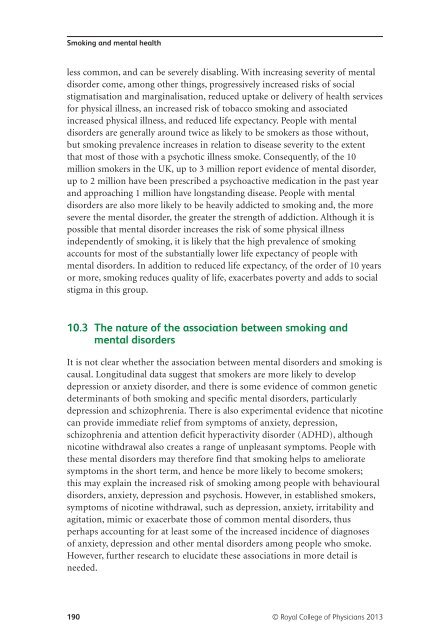Smoking and mental health - NCSCT
Smoking and mental health - NCSCT
Smoking and mental health - NCSCT
Create successful ePaper yourself
Turn your PDF publications into a flip-book with our unique Google optimized e-Paper software.
<strong>Smoking</strong> <strong>and</strong> <strong>mental</strong> <strong>health</strong><br />
less common, <strong>and</strong> can be severely disabling. With increasing severity of <strong>mental</strong><br />
disorder come, among other things, progressively increased risks of social<br />
stigmatisation <strong>and</strong> marginalisation, reduced uptake or delivery of <strong>health</strong> services<br />
for physical illness, an increased risk of tobacco smoking <strong>and</strong> associated<br />
increased physical illness, <strong>and</strong> reduced life expectancy. People with <strong>mental</strong><br />
disorders are generally around twice as likely to be smokers as those without,<br />
but smoking prevalence increases in relation to disease severity to the extent<br />
that most of those with a psychotic illness smoke. Consequently, of the 10<br />
million smokers in the UK, up to 3 million report evidence of <strong>mental</strong> disorder,<br />
up to 2 million have been prescribed a psychoactive medication in the past year<br />
<strong>and</strong> approaching 1 million have longst<strong>and</strong>ing disease. People with <strong>mental</strong><br />
disorders are also more likely to be heavily addicted to smoking <strong>and</strong>, the more<br />
severe the <strong>mental</strong> disorder, the greater the strength of addiction. Although it is<br />
possible that <strong>mental</strong> disorder increases the risk of some physical illness<br />
independently of smoking, it is likely that the high prevalence of smoking<br />
accounts for most of the substantially lower life expectancy of people with<br />
<strong>mental</strong> disorders. In addition to reduced life expectancy, of the order of 10 years<br />
or more, smoking reduces quality of life, exacerbates poverty <strong>and</strong> adds to social<br />
stigma in this group.<br />
10.3 The nature of the association between smoking <strong>and</strong><br />
<strong>mental</strong> disorders<br />
It is not clear whether the association between <strong>mental</strong> disorders <strong>and</strong> smoking is<br />
causal. Longitudinal data suggest that smokers are more likely to develop<br />
depression or anxiety disorder, <strong>and</strong> there is some evidence of common genetic<br />
determinants of both smoking <strong>and</strong> specific <strong>mental</strong> disorders, particularly<br />
depression <strong>and</strong> schizophrenia. There is also experi<strong>mental</strong> evidence that nicotine<br />
can provide immediate relief from symptoms of anxiety, depression,<br />
schizophrenia <strong>and</strong> attention deficit hyperactivity disorder (ADHD), although<br />
nicotine withdrawal also creates a range of unpleasant symptoms. People with<br />
these <strong>mental</strong> disorders may therefore find that smoking helps to ameliorate<br />
symptoms in the short term, <strong>and</strong> hence be more likely to become smokers;<br />
this may explain the increased risk of smoking among people with behavioural<br />
disorders, anxiety, depression <strong>and</strong> psychosis. However, in established smokers,<br />
symptoms of nicotine withdrawal, such as depression, anxiety, irritability <strong>and</strong><br />
agitation, mimic or exacerbate those of common <strong>mental</strong> disorders, thus<br />
perhaps accounting for at least some of the increased incidence of diagnoses<br />
of anxiety, depression <strong>and</strong> other <strong>mental</strong> disorders among people who smoke.<br />
However, further research to elucidate these associations in more detail is<br />
needed.<br />
190 © Royal College of Physicians 2013














